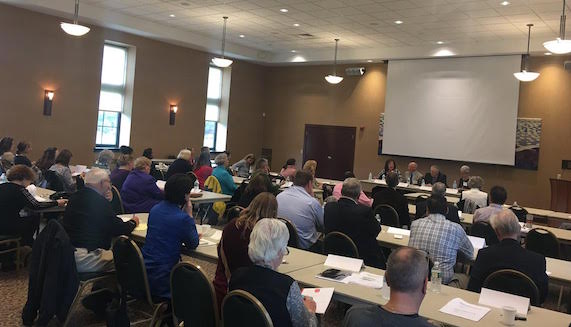Categories: New York State, Network Events
10.25.2017
Two panels focused on meeting the ambitious new statewide supportive housing development goals.

Network members and panelists at our Rochester Capacity Building Initiative events.
On October 12th, the Network convened partners in Rochester for two events focused on meeting the ambitious new statewide supportive housing development goals.
In the morning, representatives from twenty of our nonprofit members participated in a workshop titled Joint Ventures: What’s on the Table. Expert panelists included Kevin Hoffman of Richman Housing Resources, Karen Sherman of ShermanLaw, Michael Claisse of Bank of America, and Monica McCullough of MM Development Advisors. Attendees learned about the basics of Low Income Housing Tax Credit development, risks and rewards of tax credit projects, and what questions to ask when negotiating a joint venture development agreement. Whether they were new to development or had participated in dozens of deals, attendees walked away with a deeper understanding of how to approach a joint venture agreement and how to arrive at a deal that works best for the needs of their organizations. The Network looks forward to more programming on joint ventures as we strive to meet the development goals of the Empire State Supportive Housing Initiative (ESSHI).
Additional members from banks, tax credit syndicators, and for-profit developers joined us for a packed afternoon panel on ESSHI. Moderated by the Network’s Laura Mascuch, the panel featured Moira Tashjian of the NYS Office of Mental Health, Richard Umholtz of the NYS Office of Temporary and Disability Assistance, and Leonard Skrill of NYS Homes and Community Renewal. Panelists reflected on the past year of ESSHI and answered questions about the program’s implementation moving forward. According to the panelists, there were 182 applications in year two: 169 proposals with a total of 5,453 units received conditional awards.
Participants shared a great deal of information about the evolution of the initiative and imparted important information about conditional and permanent awards. To move from conditional to permanent award status,, a project must have all of its capital financing in place. Additionally, although the number of units in the project can change as the project moves forward, neither the population nor location may change from the conditional award. If groups are not 100% sure about their site location, it would be more prudent to not list the site. We are deeply grateful to Providence Housing Development Corporation for hosting this day in their beautiful Bishop Hickey Conference Center and to our generous panelists.
Check for upcoming events related to our Capacity Building Initiative here.
